Germline Exposures in the News

Uncertain Inheritance: Transgenerational Effects of Environmental Exposures
“In the last year and half there’s been an explosion in studies showing transgenerational effects from exposure to a wide array of environmental stressors”.... (Environmental Health Perspectives 10/14) 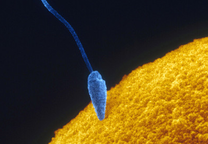
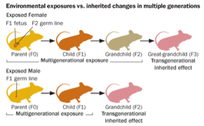
From Great Grandma to You: Epigenetic Changes Reach Down Through the Generations
Like many women with parents of the Mad Men generation, Susan Murphy grew up in a household full of cigarette smoke. Both dad and mom smoked heavily.... (Science News 3/13) 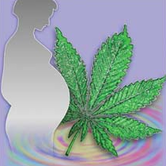
Weed: A Gateway Drug Across Generations?
If you haven’t seen marijuana in the news lately then you haven’t been paying attention. This week lawmakers in Maryland, Maine, Massachusetts, Colorado, Washington, Kentucky, and Georgia are all talking about weed....(National Geographic 3/14) |

Grandma’s curse: Some of the effects of smoking may be passed from grandmother to grandchild
One of biology’s hottest topics is epigenetics. The term itself covers a multitude of sins. Strictly speaking, it refers to the regulation of gene expression by the chemical modification of DNA, or of the histone proteins in which DNA is usually wrapped.... (The Economist 11/12) 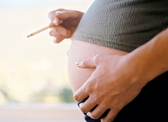
Study Finds Prenatal Exposure to Nicotine May Lead to ADHD in Grandchildren
Prenatal exposure to nicotine could manifest as attention deficit hyperactivity disorder in children born a generation later, according to a new study by Florida State University researchers.... (FSU News 2/14) 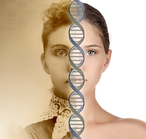
Grandma's Experiences Leave a Mark on Your Genes
Your ancestors' lousy childhoods or excellent adventures might change your personality, bequeathing anxiety or resilience by altering the epigenetic expressions of genes in the brain.... (Discover Magazine 5/13) 
Father’s Diet May Affect Offspring’s Development, Study of Mice Suggests
Watching what you eat and drink isn’t just for moms-to-be anymore. New scientific evidence suggests that the father’s diet before conception might be just as important to a child’s health.... (Washington Post 12/13) |
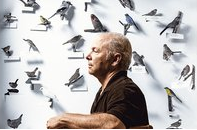
The Toxins That Affected Your Great-Grandparents Could Be In Your Genes
Michael Skinner’s biggest discovery began, as often happens in science stories like this one, with a brilliant failure. Back in 2005, when he was still a traditional developmental biologist ... (Smithsonian Magazine 12/13) 
Epigenetics: The Sins of the Father
The roots of inheritance may extend beyond the genome, but the mechanisms remain a puzzle. When Brian Dias became a father last October, he was, like any new parent, mindful of the enormous responsibility that lay before him.... (Nature 3/14) 
Tributyltin Promotes Obesity in Mice Generations
Prenatal exposure to the pesticide tributyltin increased obesity in mice for several generations by permanently changing how fat cells develop, mature and store fat, according to a new study.... (Environmental Health News 3/13) 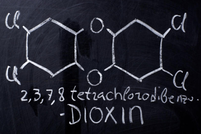
Dioxin Causes Disease Across Generations
Since the 1960s, when the defoliant Agent Orange was widely used in Vietnam, military, industry and environmental groups have debated the toxicity of its main ingredient, the chemical dioxin.... (Science Daily 9/12) |
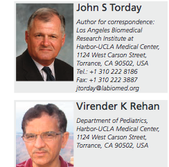
An Epigenetic "Smoking Gun" for Reproductive Inheritance
The epidemiologic evidence for epigenetic inheritance has been accumulating for decades, with the expectation that the scientific evidence for the underlying mechanism would surely be forthcoming....(Expert Reviews 2013) 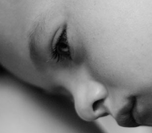
Onslaught of Autism: A Mom's Crusade Could Help Unravel Scientific Mystery
Jill Escher’s dogged quest to unravel why two of her children are autistic has drawn the attention of scientists, and may ultimately lead to a greater understanding of how prescription drugs may harm the health of generations to come.... (Environmental Health News 7/13) 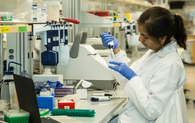
Epigenetics: The Controversial Science Behind Racial and Ethnic Health Disparities
Why what we eat, are exposed to, and experience today may shape the health of our descendants tomorrow.... (National Journal 3/14) 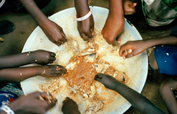
Epigenetic Effects of Mom’s Diet: Molecular markers of a mother’s nutrition around conception can be found in her child’s DNA
Maternal nutrition around the time of conception can affect the regulatory tagging of her child’s DNA from the earliest embryonic stages.... (The Scientist 4/14) |
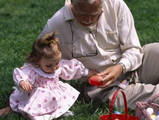
Are RNA Fragments Making Gene Tweaks in Descendants?
A solution may be nigh to one of the biggest mysteries of biology – how the effects of a person's lifestyle can be passed on to future generations without any changes to the genetic code.... (New Scientist 4/14) 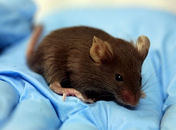
Traces of Trauma in Sperm RNA
The offspring of mice that suffered early-life stress show signs of the disturbance their parent experienced, researchers from the University of Zurich in Switzerland and their colleagues have found, pointing to a potential RNA-based mechanism by which trauma may be epigenetically inherited.... (The Scientist 4/14) 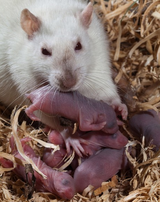
Epigenetics: How to alter your genes
We’ve long been told our genes are our destiny. But it’s now thought they can be changed by habit, lifestyle, even finances. What does this mean for our children?... (The Telegraph 10/13) 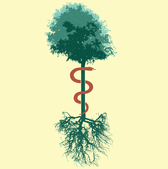
Does Family Medical History Matter to a Health Nut?
And one of the most mind-blowing discoveries in epigenetics over the past ten years has been this one: Humans don’t inherit only their genes from their ancestors. They also inherit the residual effects of some of their grandparents’ life experiences on those genes.... (New York Magazine 6/14) 
You Are What You Eat, But What About Your DNA?
Human and animal studies have demonstrated that the prenatal environment affects adult health and disease. Epidemiological studies have shown that gestational exposure to maternal starvation or overnutrition of the paternal grandfather is linked to increased risks for cardiovascular diseases and diabetes (1, 2). In both cases, adverse metabolic health outcomes can be transmitted multigenerationally.... (Science 8/14) 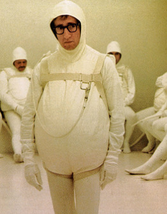
Sperm Can Carry Dad's Stress as Well as Genes
New research shows that sperm can carry the effects of a stressed father as well as his DNA. ...[W]hile environment rarely changes the DNA sequence of a gene (i.e., a "mutation"), it can cause epigenetic changes in the gene's regulation. And if that occurs in an egg, such epigenetic markers can be passed to offspring, resulting in "nongenetic transmission of traits."... (Wall Street Journal 9/14) 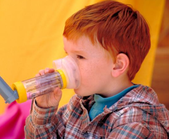
Increased asthma risk for babies whose father smokes before conception
When planning to get pregnant, women often have many things to consider even before conception, such as increasing folic acid intake and stopping smoking or drinking alcohol. But what about the would-be father? Though general belief maintains that men do not need to make any lifestyle changes, a new study suggests babies whose fathers smoked prior to conception have a greater risk of asthma.... (Medical News Today, 9/14) 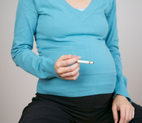
Why Pregnant Women Who Smoke Might Have Kids With Worse Sperm
Add diminished fertility to the long list of reasons why women should avoid smoking while pregnant or breast feeding. The mice sons—called pups—of mothers exposed to the smoke equivalent of a pack of cigarettes a day during that time wind up with sperm that struggle in the reproduction process, according to a new study in mice published in the journal Human Reproduction.... (Time 10/14) 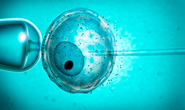
What’s next for the world’s 5 million IVF babies?
When in-vitro fertilisation (IVF) began in 1978, some scientists were worried that the babies born as a result of it might suffer birth defects and health problems.... Recent discoveries in epigenetics – the study of how environmental factors can affect gene activity, and how a person’s risk of getting chronic diseases is “programmed” into them before they are even born – have opened up new possibilities.... (The Guardian 11/14) 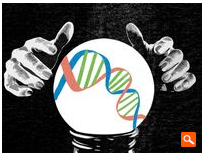
Radiolab: Inheritance
Once a kid is born, their genetic fate is pretty much sealed. Or is it? This hour, we put nature and nurture on a collision course and discover how outside forces can find a way inside us, shaping not just our hearts and minds, but the basic biological blueprint that we pass on to future generations.... http://www.radiolab.org/story/251876-inheritance/ 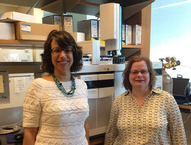
Persistent health effects from 1973 toxic chemical mix-up in Michigan
“We’re trying to understand why the PBB does seem to be having such long-lasting effects,” says Michele Marcus. “We do have some preliminary evidence that PBB may affect the expression of genes on the DNA and that can be transmitted down the generations.” (Michigan Radio 12/14) 
Can diet and exercise affect your genes (and your germline)?
"DNA has been called the building blocks of life, the blueprint that we’re born with that maps out the on/off switches for genes that are hardwired into our cells. The field of epigenetics looks at how exercise, diet, and other environmental factors can affect how those genes are expressed. Andy Feinberg, Director of the Epigenetics Center at the Johns Hopkins University of Medicine, and Carl Johan Sunderberg, a molecular exercise physiologist, discuss the latest in epigenetics research..." (NPR Science Friday 1/15) 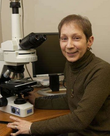
Effect of BPA and estradiol on sperm development seen by researchers
A direct link between the plastics component bisphenol A, or BPA, and disrupted sperm production has been discovered by researchers. They say the chemical disrupts the delicate DNA interactions needed to create sperm. This work may have unearthed the physiological mechanism that could account for decreased sperm counts seen in several human studies.... (Science Daily 1/15) 
DNA changes could explain why autism runs in families, according to study
Scientists have come up with a possible explanation for why autism appears to run in families – suggesting it can be triggered by changes in the chemicals attached to DNA. A study of sperm from 44 fathers of babies who showed early signs of autistic symptoms shows that “epigenetic” changes to the men’s DNA could transmit the condition to the next generation.... (The Independent 4/15) 
Large Study Goose-Eggs on Autism Genetics Findings
Results of a recent study failed to identify any genome-wide significant associations in a large autism sample or in phenotypic subgroups. This means that the extreme clinical variability observed among patients with autism does not closely reflect common genetic variation. “This study did not provide good evidence that selecting patients with similar symptoms results in a greater ability to find autism genes,” said Dr. John Krystal, Editor of Biological Psychiatry. “This might suggest that some of the clinical variability in autism arises from causes other than genetic vulnerability, such as epigenetic changes or other responses to the environment.” (Elsevier 4/15) 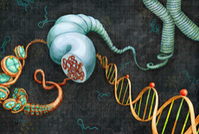
Parents' DNA tags tied to autism symptoms in toddlers
Women who have unusual patterns of chemical tags on their DNA during pregnancy may give birth to children who develop autism symptoms. The preliminary results are being presented today at the 2015 International Meeting for Autism Research in Salt Lake City, Utah. Chemical tags such as methyl groups can turn genes on or off and may appear in response to environmental triggers.... (SFARI 5/15) 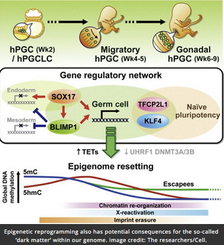
Reprogramming of DNA Observed in Human Germ Cells for First Time
A team of researchers led by the University of Cambridge has described for the first time in humans how the epigenome – the suite of molecules attached to our DNA that switch our genes on and off – is comprehensively erased in early primordial germ cells prior to the generation of egg and sperm. However, the study, published today in the journal Cell, shows some regions of our DNA – including those associated with conditions such as obesity and schizophrenia – resist complete reprogramming.... (Neuroscience News 6/15) 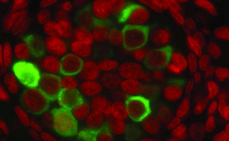
Study finds cells that become sperm or eggs in humans are vulnerable during pregnancy
A new study, published online today by Amander Clark, Ph.D., at the UCLA Eli & Edythe Broad Center of Regenerative Medicine and Stem Cell Research, significantly furthers the understanding of the human germline – the cells that create eggs or sperm in humans during prenatal development in the womb. The highly specialized cells of the germline, called germ cells, are the only cell type in the body capable of passing parents' genes on to their biological children. ....the study looks closely at how... these important cells lack protection during a phase of development, leaving them vulnerable to damage.... (Phys.org 5/15) 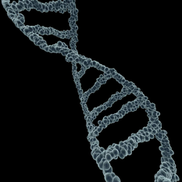
Explaining ‘Epigenetics': The Health Buzzword You Need to Know
Getting a bad genetic draw from mom and dad is the most common way to inherit risks for diseases like cancer and heart problems. But there’s another way to pick up genetic changes that researchers are starting to pay attention to.... (Time, 6/15) 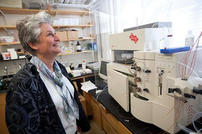
Expanding the brain: Research identifies more than 40 new imprinted genes
It's among the cornerstones of biology: All mammals inherit two copies ― one from their mother, the other from their father—of every gene, in part to act as a backstop against genetic problems. If a gene is damaged or malfunctions, its double can pick up the slack. When it comes to inheritance, however, not all genes are created equal. Led by Catherine Dulac, the Higgins Professor of Molecular and Cellular Biology, a team of researchers has identified more than 40 new "imprinted" genes, in which either the maternal or paternal copy of a gene is expressed while the other is silenced. The findings...could have important implications for understanding the brain.... (Harvard Gazette, 7/15) 
Environmental-Epigenetic-Evolutionary Chain’s Genetic Link
Environmental factors, epigenetic changes, and genetic mutations form a chain that spans generations, contributing to disease and evolution. And a key link in this chain is genomic instability. According to a new study, genomic instability that connects back to exposure-specific epigenetic change may, through germline inheritance, lead to genetic mutations—specifically, copy number variations—that become apparent only after several generations have passed.... (8/15, GEN News) Genetic analysis: Rare mutations cause half of all autism cases
Researchers found that rare mutations of a set of genes could be responsible for roughly half of all autism spectrum disorder, or ASD, cases. The "spontaneous" genetic mutations, researchers said, most likely happen to genes that are essential for normal brain development.The new theory differs from a commonly held one that ASD is caused by a combination of genetic mutations that are harmless individually but when combined cause the disorder. Instead, researchers say mutations present in a germ cell or fertilized egg can result in ASD.... (UPI 9/15) 
Can You Blame Your Health Problems on Your Grandfather? Possibly
Discovery of how environmental memories may be transmitted from a father to his grandchildren If you have diabetes, or cancer or even heart problems, maybe you should blame it on your dad’s behaviour or environment. Or even your grandfather’s. That’s because, in recent years, scientists have shown that, before his offspring are even conceived, a father’s life experiences involving food, drugs, exposure to toxic products and even stress can affect the development and health not only of his children, but even of his grandchildren.... (Newswise 10/15) 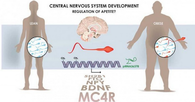
Listen up, dads: Obesity makes your sperm weird
A new study adds to the growing pile of evidence that men should worry about their prenatal health, too: Their sperm may carry epigenetic markers that can help determine the weight of their offspring. The research is still in its early stages, so you can't go blaming Dad for every french fry you eat. But it's becoming clearer that there's more to parenthood than just genes -- the state of your body at the moment of conception may carry a lot of weight for your child's future.... Researchers found that the sperm cells of lean and obese men had different epigenetic marks... (Washington Post 12/15) 
Fathers May Pass Down More Than Just Genes, Study Suggests
In 2013, an obese man went to Hvidovre Hospital in Denmark to have his stomach stapled. All in all, it was ordinary bariatric surgery — with one big exception. A week before the operation, the man provided a sperm sample to Danish scientists. A week after the procedure, he did so again. A year later, he donated a third sample. Scientists were investigating a tantalizing but controversial hypothesis: that a man’s experiences can alter his sperm, and that those changes in turn may alter his children.... (New York Times, 12/15) 
Autism-like Changes in Gene Expression Caused by Common Pesticides
Heritability and epidemiological studies have linked autism and neurodegeneration risks to environmental factors such as pesticides, but these studies have failed to resolve which chemicals merit extra scrutiny. This is a significant shortcoming, given that more than 80,000 chemicals are registered for use in the environment.... (Gen News 3/16) 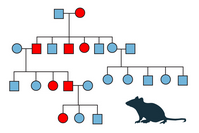
Prenatal infection may alter behavior in generations of mice
Triggering immune defenses in pregnant mice leads to autism-like behaviors not only in their pups, but also in the following generations, suggests a new study. Having a severe infection during pregnancy is associated with an increased risk of having a child with autism, bipolar disorder or schizophrenia.... The new study found that some of these traits, including social and sensory problems, are present even in the following two generations — specifically among the pups whose fathers were exposed to a viral compound in the womb.... (Spectrum News 5/16) 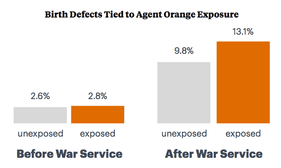
The Children of Agent Orange
For decades, Vietnam veterans have suspected that the defoliant harmed their children. But the VA hasn’t studied its own data for clues. A new ProPublica analysis has found that the odds of having a child born with birth defects were more than a third higher for veterans exposed to Agent Orange than for those who weren’t.... (Pro Publica 12/16) 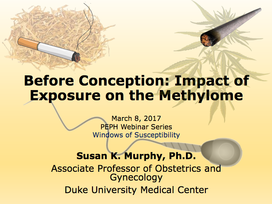
Before Conception: Impact of Exposure on the Methylome
NIEHS Partnerships for Environmental Public Health presentation by Susan Murphy, PhD, Duke University (3/17) 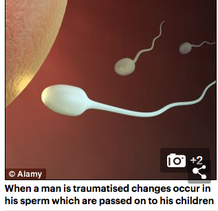
How the trauma of life is passed down in sperm, affecting the mental health of future generations
The children of people who have experienced extremely traumatic events are more likely to develop mental health problems. And new research shows this is because experiencing trauma leads to changes in the sperm. These changes can cause a man’s children to develop bipolar disorder and are so strong they can even influence the man’s grandchildren. Psychologists have long known that traumatic experiences can induce behavioural disorders that are passed down from one generation to the next. However, they are only just beginning to understand how this happens.... (Daily Mail 4/17) 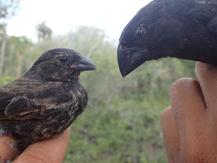
How Do Darwin's Finches Respond So Quickly To Environmental Changes?
Epigenetics may be how Darwin’s finches rapidly change their beak size and shape in response to sudden environmental changes, such as drought or human disturbance, in the absence of gene mutations... Epigenetic changes can activate or intensify, lessen or even completely silence, the activity of a particular gene without changing its DNA sequence.... (Forbes, 9/17) 
Prenatal exposure to plasticizer may affect male fertility in future generations
Chemicals found in a variety of routinely used consumer products may be contributing to the substantial drop in sperm counts and sperm quality among men in recent decades, a new study in mice suggests.... (Science Daily 3/18) 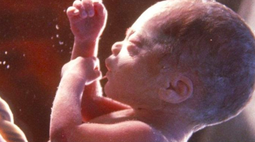
Painkillers in pregnancy may affect babies' future fertility
Taking painkillers during pregnancy could affect the fertility of the unborn child in later life, new research suggests. Edinburgh University found the drugs may also affect the fertility of future generations, by leaving marks on DNA. Experts said the findings added to growing evidence some medicines, including Paracetamol, should be used with caution during pregnancy. Researchers stressed advice for pregnant women remained unchanged. Current guidelines say, if necessary, Paracetamol should be used at the lowest possible dose for the shortest possible time. Ibuprofen should be avoided during pregnancy. The study looked at the effects of Paracetamol and ibuprofen on samples of human foetal testes and ovaries.... (BBC 4/18) 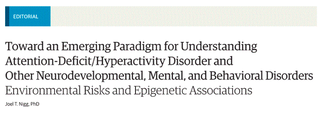
Toward an Emerging Paradigm for Understanding Attention-Deficit/Hyperactivity Disorder and Other Neurodevelopmental, Mental, and Behavioral Disorders
Are psychiatric and neurodevelopmental conditions fundamentally epigenetic disorders? The answer to this question may shape the next generation of clinical science related to psychopathology. The genetic metaphor for developmental psychopathology has long been considered inadequate for the complex dynamics of human development. However, the rise of behavioral epigenetics has amplified the possibility of an actionable paradigm that effectively integrates genetic liability and an environmental modulation of developmental trajectories. If the epigenetic perspective proves to be productive, it would open up not only new treatments but also new preventive approaches that reach the earliest days and months of life.... (JAMA Pediatrics editorial 5/18) 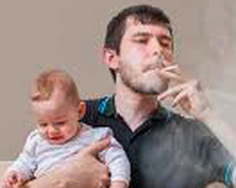
Father's nicotine use can cause cognitive problems in children and grandchildren
A father's exposure to nicotine may cause cognitive deficits in his children and even grandchildren, according to a new study in mice. The effect, which was not caused by direct secondhand exposure, may be due to epigenetic changes in key genes in the father's sperm. (Science Daily 10/18) 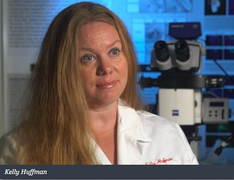
Drinking Alcohol While Pregnant Could Have Transgenerational Effects
New study by UCR psychology professor finds that prenatal ethanol exposure (from maternal alcohol consumption during pregnancy) causes abnormalities in the brain and behavior that may be passed on for many generations. Soon-to-be mothers have heard the warning – don’t drink while pregnant.... Today, there is a new reason why an expectant mother should put down that glass of wine – drinking alcohol during pregnancy will not only affect her unborn child, but may also impact brain development and lead to adverse outcomes in her future grand- and even great-grandchildren.... (UCR Today, 7/2017) 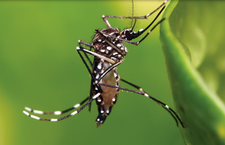
Ibuprofen’s Effects Found in Offspring of Exposed Mosquitoes
Results of a study suggest that toxicologists should look further than exposed individuals for contaminant effects. The scientists observed almost no change in mosquitoes that were exposed to the anti-inflammatory drug as larvae, relative to controls. But the exposed mosquitoes’ progeny, which did not themselves get the ibuprofen dose, developed more quickly and were more tolerant of starvation than controls.... (The Scientist, 10/18) 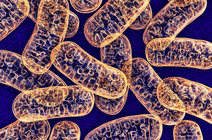
Obese mouse mothers trigger heart problems in offspring
Effects of high-fat, high-sugar diet on heart passed down three generations. A diet high in fats and sugars is known for its unhealthy effects on the heart. Scientists now have found that a high-fat, high-sugar diet in mouse mothers before and during pregnancy causes problems in the hearts of their offspring, and that such problems are passed down at least three generations, even if the younger generations only eat a standard mouse chow diet.... (Washington University, 3/19) 
A flame retardant commonly found in vintage furniture may be affecting human sperm
The foam in old furniture may contain biphenyl-153, which decreases sperm quality and can cause birth defects. A new study reveals that polybrominated biphenyl-153 (PBB-153) — a flame retardant present in older consumer products, which has been banned since 1976 — may cause serious birth defects by altering the genetic code in sperm. The new study into this common household chemical raises questions about the present-day consequences of corporate malfeasance nearly half a century ago.... (Salon, June 2020) |
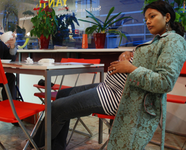
How your parents' diet before your birth impacts your health
Chromosomes and genes contain the blueprint for your physical characteristics. But your parents' health and diet before you were conceived can also affect how your genes are expressed – and impact your long-term health. There’s a good explanation for this.... (The Conversation 5/14) 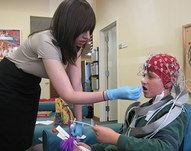
Why Autism Risk Rises with Mom’s Age: Study May Shed Light
New research may help explain why autism is more common among the children of older mothers. The study, in PLOS-Genetics, implicates an accumulation of changes in the mechanisms that control gene activity in the developing brain.... (Autism Speaks Science News 6/14) 
Exposure to Pesticides When Pregnant Linked to 3 Generations of Disease
In the post-Silent Spring 1960s, when the pesticide DDT was discovered to be toxic to humans and wildlife and to persist for years.... (Newsweek 7/14) 
Parenting From Before Conception
At fertilization, the gametes endow the embryo with a genomic blueprint, the integrity of which is affected by the age and environmental exposures of both parents. Recent studies reveal that parental history and experiences also exert effects through epigenomic information not contained in the DNA sequence, including variations in sperm and oocyte cytosine methylation and chromatin patterning, noncoding RNAs, and mitochondria.... (Science 8/14) 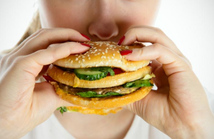
Parents' lifestyle affects offsprings' health, even before conception
A child's future health is not only influenced by parents' genes, according to researchers from The University of Adelaide in Australia; unhealthy parents may set up their children for poor health, even before they are conceived. The research team, including Prof. Sarah Robertson of the Robinson Research Institute at the university, recently published their findings in the journal Science... (Medical News Today 8/14) 
How epigenetic memory is passed through generations: Sperm and eggs transmit memory of gene repression to embryos
A growing body of evidence suggests that environmental stresses can cause changes in gene expression that are transmitted from parents to their offspring, making 'epigenetics' a hot topic. Epigenetic modifications do not affect the DNA sequence of genes, but change how the DNA is packaged and how genes are expressed. Now, scientists have shown how epigenetic memory can be passed across generations and from cell to cell during development.... (Science Daily 9/14) 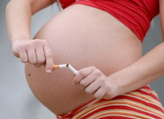
Smoking during pregnancy could damage sons' fertility
Though it is well known that smoking in pregnancy poses health dangers to offspring, in the US, around 20% of young women continue to smoke while pregnant. Now, researchers who conducted a study in mice say smoking during pregnancy or breastfeeding could damage the future fertility of sons.... (Medical News Today 10/14) 
Smokers 'more likely to have a baby girl'
Couples who are both smokers when trying for a baby are more likely to have a daughter, researchers claim. They say sperm carrying the male Y chromosome is damaged by tobacco, reducing the chances of conceiving a son. The study offers a possible reason for a decline in the ratio of baby boys to baby girls.... (Daily Mail 12/14) 
A DES grandson sings a poem of despair penned by his mother, a DES daughter
[Editor's note: while this is not exactly a "Germline Exposures in the News" item, we could not pass up the opportunity to note this bit of "Germline Exposures in the Arts."] An excerpt from this remarkable rap: "How can they live knowing what they have done To DES daughters and DES sons So on and on and on it’ll go No, will it ever stop? No I don’t think so "You did horrible things to my daughters and sons Is the money well worth the damage you have done? I didn’t know I passed on something that bad To the five greatest gifts that I ever had...." (YouTube: 12/14) 
The Most Polluted Generation
Penelope Jagessar Chaffer, a multi award winning filmmaker and artist, writer, feminist, children’s environmental health advocate and global environmentalist, speaks on the genetic dysregulation caused by endocrine-disrupting chemicals. (TED 12/14) https://www.youtube.com/watch?v=LlQXs0yofMs 
Environmental Impact Can Span Generations
Biological Legacy: By considering connections between the epigenome and the environment, McGill University researchers are gathering new insights about intergenerational genetic linkages and paternal influences on the incidence of disease.... (Research Media, International Innovation) 
Intergenerational Epigenetic Effects of Dad’s Diet
The effect of epigenetic marks across generations has helped bring epigenetics to the public eye like never before. The health implications are enormous and so is the contribution to basic science, particularly evolution. However, one important distinction is whether it is a true form of molecular inheritance, known as transgenerational epigenetic inheritance, or the shared effect of a exposure known as a transgenerational epigenetic effect or an intergenerational effect (depending on who you ask).... (Epigenie 2/15) 
BPA can adversely affect reproduction of future generations of fish
Bisphenol A is a chemical that is used in a variety of consumer products, such as water bottles, dental composites and resins used to line metal food and beverage containers. Often, aquatic environments such as rivers and streams become reservoirs for contaminants, including BPA. Now, scientists have determined that fish exposed to endocrine-disrupting chemicals will pass adverse reproductive effects onto their offspring as many as three generations later.... (Science Daily 3/15) 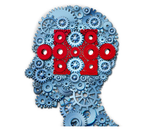
Sperm with Specific Epigenetic Tags Linked to Autism
Scientists from Johns Hopkins say they have found that DNA from the sperm of some men whose children had early signs of autism shows distinct patterns of regulatory tags that could contribute to the condition. Autism spectrum disorder (autism) reportedly affects one in 68 children in the U.S. Although studies have identified some culprit genes, most cases remain unexplained. But many experts agree that autism is usually inherited, since the condition tends to run in families. In this study, investigators looked for possible causes for the condition not in genes themselves, but in the "epigenetic tags" that help regulate genes' activity.... (Genetic Engineering & Biotechnology News 4/15) 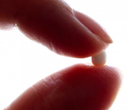
Fish don’t want birth control, but scientists say they get it from your pill
Your birth control pill is affecting more than just your body. Flushed down toilets, poured down sinks and excreted in urine, a chemical component in the pill wafts into sewage systems and ends up in various waterways where it collects in fairly heavy doses. That's where fish soak it up. A recent survey by the U.S. Geological Survey found that fish exposed to a synthetic hormone called 17a-ethinylestradiol, or EE2, produced offspring that struggled to fertilize eggs. The grandchildren of the originally exposed fish suffered a 30 percent decrease in their fertilization rate.... (Washington Post 4/15)  Azim Surani Azim Surani
First evidence of how parents' lives could change children's DNA
For the first time, scientists have discovered a mechanism in humans that could explain how your lifestyle choices may impact your children and grandchildren's genes. Mounting evidence suggests that environmental factors such as smoking, diet and stress, can leave their mark on the genes of your children and grandchildren. For example, girls born to Dutch women who were pregnant during a long famine at the end of the second world war had twice the usual risk of developing schizophrenia. Likewise, male mice that experience early life stress give rise to two generations of offspring that have increased depression and anxiety, despite being raised in a caring environment.... (New Scientist 6/15) 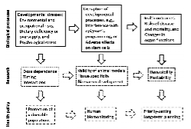
Life-Long Implications of Developmental Exposure to Environmental Stressors: New Perspectives
The Developmental Origins of Health and Disease (DOHaD) paradigm is one of the most rapidly expanding areas of biomedical research.... The conference highlighted vulnerable exposure windows that can occur as early as the preconception period and epigenetics as a major mechanism than can lead to disadvantageous “reprogramming” of the genome, thereby potentially resulting in transgenerational effects.... (Endocrinology, 8/15) 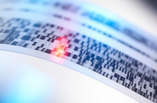
Imprinted Gene Implicated in Autism
Scientists are now one step closer to understanding how genetic mutations contribute to autism. In a study released Thursday in the journal Cell, experts from UNC School of Medicine discovered how one specific autism-linked gene mutation actually works. This is the first time scientists have observed how a common type of mutation, known as a missense mutation, could contribute to autism....[it] disrupts the on/off switch that controls the enzyme UBE3A.... (Yahoo Health, 8/15) 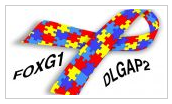
Imprinted Genes Implicated in the Puzzle of Autism
Imprinted genes are monoallelically expressed in a parent-of-origin dependent manner. Since the nonfunctional copy is silenced epigenetically, environmental factors that alter the epigenome can result in what is called loss of imprinting (LOI). This results in imprinted genes being either hypo or hyper expressed because of alterations in the epigenome (e.g. DNA methylation) rather than mutations in the genome. To determine the overall role of imprinting in the puzzle of ASD requires the identification of the complete repertoire of human imprinted genes and their regulatory elements - The Imprintome. Although this information is presently not available, it is crucial to determine now if the expression of FOXG1 and/or DLGAP2 are epigenetically dysregulated in ASD. (7/15 GeneImprint.com)  Wolf Reik Wolf Reik
Leaving an Imprint
Among the first to discover epigenetic reprogramming during mammalian development, Wolf Reik has been studying the dynamics of the epigenome for 30 years....Thirty years later, he continues to work on the dynamics of epigenetic changes, the role of reprogramming in stem cells, mouse development, and transgenerational inheritance of acquired epigenetic marks. (The Scientist 8/15) 
Grandmothers Who Smoke During Pregnancy May Increase Asthma Risk in Grandchildren
You might get more passed down from your grandparents than just the color of their eyes or the shape of their nose. A recent study presented at the European Respiratory Society’s International Congress has found that grandmothers who smoked during their pregnancies passed along an increased risk of asthma to their grandchildren — even if the mother didn’t smoke.... (Medical Daily 9/15) 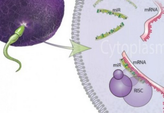
)Stressed dads affect offspring brain development through sperm microRNA
More and more, scientists have realized that DNA is not the only way that a parent can pass on traits to their offspring. Events experienced by a parent over a lifetime can also have an impact. Now University of Pennsylvania researchers have shown at the molecular level how experiencing stress changes a male mouse's sperm in such a way that it affects his offspring's response to stress. This change is imparted epigenetically, or through a means other than the DNA code, by molecules called microRNAs, or miRs.... (Science Daily, 10/15) 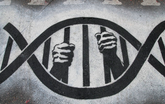
Don’t blame grandma yet, but your asthma may be her fault
It’s natural to wonder if your environment is changing you. It’s no secret that smoking and pesticides are bad for your lungs and that exercise is good for your heart. But these things may actually change the function of our genes in ways that can be passed on to our children and grandchildren. Enter epigenetics, a bridge for this burning question of nature versus nurture. While genetics typically refers to the physical structure of DNA, epigenetics is a process. Epigenetics describes how environmental factors like stress, environmental toxins and nutrition can alter our DNA, the production of proteins and ultimately how a cell behaves.... (PBS Newshour 12/15) 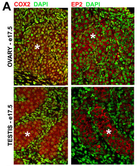
Analgesic exposure in pregnant rats affects fetal germ cell development with inter-generational reproductive consequences
Analgesics which affect prostaglandin (PG) pathways are used by most pregnant women. As germ cells (GC) undergo developmental and epigenetic changes in fetal life and are PG targets, we investigated if exposure of pregnant rats to analgesics (indomethacin or acetaminophen) affected GC development and reproductive function in resulting offspring (F1) or in the F2 generation.... Assuming our results are translatable to humans, they raise concerns that analgesic use in pregnancy could potentially affect fertility of resulting daughters and grand-daughters. (Nature 1/16) 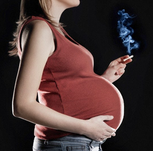
Smoking in pregnancy 'chemically ALTERS your baby's genes - increasing risk of future disease and birth defects'
Scientists reveal smoking during pregnancy can alter a baby's DNA. The effects of smoking on fetuses mirrors those of adult tobacco users. Experts found more than 6,000 genetic locations where DNA was altered.... (Daily Mail 3/16) 
‘Science junkie’ bets big on autism’s environmental origins
Jill Escher can talk knowledgeably for hours, and hours, about autism — about its prevalence, which genes and environmental factors may be involved and how brain development may go awry in the brains of children with the condition.... Her theory goes something like this: In 1965, when she was in her mother’s womb, hormones her mother took during pregnancy damaged the DNA in Escher’s eggs. (Girls are born with all the eggs they will ever have.) The hormones left her seemingly unscathed but, decades later, caused her two children to have autism. In other cases, tobacco smoke or chemicals such as hormones or anesthesia drugs may alter eggs or sperm precursors.... (Spectrum News 7/16) 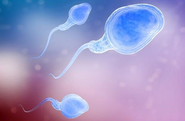
How your washing machine could be damaging fertility
The mystery of how hormone-disrupting chemicals have come to be found in lakes and rivers has been solved, and the culprit is the washing machine. Scientists have long puzzled as to how flame retardant compounds and chemicals used to make plastics bendy end up in the environment as factories are careful not to allow spillages. The levels of phthalates and retardants in the natural world is worrying because there is increasing evidence that they damage fertility and could be the reason why male sperm counts have fallen dramatically since the 1940s.... (Telegraph 8/16) 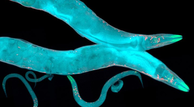
Scientists Have Observed Epigenetic Memories Being Passed Down for 14 Generations
The most important set of genetic instructions we all get comes from our DNA, passed down through generations. But the environment we live in can make genetic changes, too. Researchers have now discovered that these kinds of environmental genetic changes can be passed down for a whopping 14 generations in an animal – the largest span ever observed in a creature, in this case being a dynasty of C. elegans nematodes (roundworms).... (Science Alert 4/17) 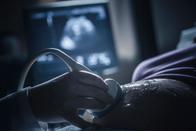
Grandmother's Smoking Associated With Grandchildren's Autism Spectrum Disorder
It seems that grandma's cigarette smoke could affect her daughter's developing eggs in the womb. There's no shortage of guidance around the dangers of smoking cigarettes – but this latest finding could prompt further scrutiny of the practice. A University of Bristol study, published in Scientific Reports, found that if a girl's maternal grandmother smoked while pregnant, she gave her granddaughter a 67 percent higher chance of showing signs associated with autism, such as poor social communication and repetitive behaviors. She also gave all her grandchildren a 53 percent higher risk of being diagnosed with autism spectrum disorder.... (US News 4/17) 
Phthalate levels in expectant fathers influence sperm epigenetics, study suggests
Early results from a larger, ongoing study led by environmental health scientist Richard Pilsner at the University of Massachusetts Amherst suggest that phthalate levels in expectant fathers have an effect on couples' reproductive success via epigenetic modifications of sperm DNA.... (News-Medical.net 9/17) 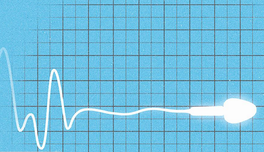
Male Infertility crisis in US has experts baffled
Hagai Levine doesn’t scare easily. The Hebrew University public health researcher is the former chief epidemiologist for the Israel Defense Forces, which means he’s acquainted with danger and risk in a way most of his academic counterparts aren’t. So when he raises doubts about the future of the human race, it’s worth listening. Together with Shanna Swan, a professor of environmental medicine and public health at the Icahn School of Medicine at Mount Sinai, Levine authored a major new analysis that tracked male sperm levels over the past few decades, and what he found frightened him. “Reproduction may be the most important function of any species,” says Levine. “Something is very wrong with men.”... (Newsweek 9/17) 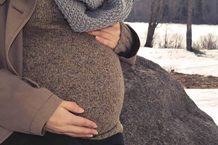
Pregnancy Drug DES May Have Triggered ADHD in Grandchildren of Women Who Used It
A new study reveals elevated risks of ADHD diagnosis in grandchildren of women who took a synthetic estrogen drug, known as DES, between 1948 and 1971. This is the first study to provide evidence of the potential neurodevelopmental consequences of DES use across generations.... (Neuroscience News 5/18) 
Passing Down Poison: Grandchildren of contaminated veterans showing birth defects
Birth defects and heart problems are showing up not only in the children, but the grandchildren of veterans who served in America's military during the Vietnam War. The question is whether Agent Orange, a powerful poison sprayed by the military to wipe out vegetation, is a contributing factor.... (News Channel 8 Florida 5/18) 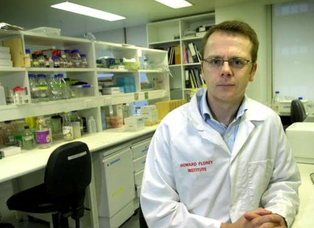
DNA clue into how unhealthy men could be risking future generations’ health
We are all dealt a genetic “deck of cards” at conception, with our parents each contributing half the DNA pack. But researchers are uncovering evidence that we are also handed an “epigenetic” hand — instructions that sit within the genome — that determines what parts of the DNA gets switched on or off. Melbourne scientists are among those contributing to the growing evidence that lifestyle factors — for better or worse — can change our epigenome. These changes consequently can affect the future health of offspring.... (Herald Sun, Australia 9/2018) 
Effects of Antidepressants Span Three Generations in Fish
The effects of antidepressant exposure during early development can pass down through three generations of offspring—at least in zebrafish. A new study, published today (December 10) in PNAS, reveals that fluoxetine, a commonly used antidepressant that goes by the brand name Prozac, can alter hormone levels and blunt stress responses in an exposed embryo and its descendants.... (The Scientist, 10/18) 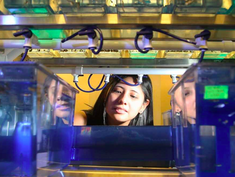
Prozac passes on altered behaviour to next three generations in fish, researchers find
Fish exposed to the antidepressant drug Prozac pass on altered behaviour to the next three generations, raising questions about what might happen to human children whose mothers take the drug. At the University of Ottawa, researchers Vance Trudeau and Marilyn Vera-Chang exposed fish eggs and newly-hatched fish to Prozac levels typical of what would cross the human placenta and reach an embryo. Trudeau and others had already studied side-effects of these drugs in fish for years, concentrating on potential effects on reproduction.... (Ottawa Citizen, 12/18) 
Toxicants can affect sperm and eggs, pose risks for offspring
Two experts visited NIEHS to discuss how reproductive cells’ exposure to harmful agents can lead to health problems in later generations. Jill Escher, J.D, a research philanthropist and advocate for the autism community, visited NIEHS Sept. 24 to discuss a topic she says needs more attention — germline exposure to toxicants. The germline refers to both mature sperm and eggs, called gametes, and the earlier cells that produce them.... (NIEHS Environmental Factor, November 2019) 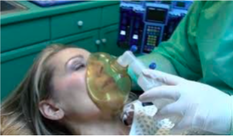
Count Backwards from 100: A New Hypothesis of Autism Emerges
New paper raises questions about heritable impacts of general anesthesia. The relentless increase in autism over the past several decades is perhaps the greatest medical mystery of our time—the California Department of Developmental Services, for example, reports a mind-boggling 4,000 percent increase in autism incidence between 1989 and 2020. Some researchers argue that such a dramatic rise suggests an environmental trigger or triggers—but what?.... (Psychology Today, July 2020) |
